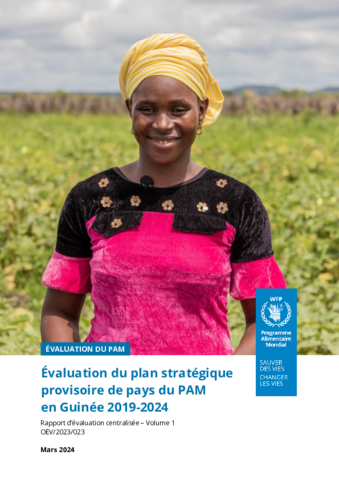
The evaluation covered the implementation periods of the transitional interim country strategic plan and the interim country strategic plan (January 2018 to May 2023).
It aimed to determine WFP's strategic positioning, its contribution to the achievement of outcomes, its effectiveness in implementation and the factors explaining the results achieved.
The interim country strategic plan was designed to achieve two major strategic shifts: i) to gradually move WFP from direct food assistance to engagement in a technical partnership with the Government; and ii) to present WFP as a catalyst for sustainable solutions to hunger through the implementation of resilience building and livelihood strengthening activities and the addition of a nutrition dimension to all relevant interventions.
WFP is recognized at the national level for its efficiency, its experience in logistical support and its field presence. At the decentralized level, however, coordination and exchange of experiences with other United Nations entities and strategic partners could be improved.
WFP has contributed to the achievement of food and nutrition security objectives in Guinea. However, targets relating to the number of beneficiaries have not been met, except in 2018. In addition, the interventions carried out under the provisional country strategic plan do not include exit strategies.
The WFP country office in Guinea is increasingly focusing its efforts on agricultural development, which should be supported by technical skills that take account of the country's agro-ecological diversity and local knowledge. Some initiatives have promoted an integrated approach to resilience, but the application of this approach in Guinea faces a number of problems relating to beneficiary targeting, geographical coverage, operational choices and possible exit strategies.
The interim country strategic plan reflects WFP's strong commitment to working for the most vulnerable, particularly in relation to nutrition-related risks, exclusion and gender inequality. However, the approaches to nutrition do not systematically address the underlying causes of vulnerability. The irregular provision of nutrition support in some severely affected regions, and the lack of sustained funding, contribute to undermining WFP's ability to achieve more sustainable results with regard to nutrition.
Participation by beneficiary communities has been extensive and satisfaction with the support received has been high. Nevertheless, community feedback mechanisms are not fully operational, needs analysis and targeting suffer from a lack of up-to-date data, and monitoring data do not enable the impact of activities to be properly measured, which hampers operational decision making.
The evaluation gave rise to four recommendations focusing on the following elements: strengthen strategic and operational partnerships by supporting joint activities and prioritizing the most promising partnerships; improve the preparation of integrated resilience projects, including the stages prior to their implementation, and forest out clear exit strategies; promote inclusive and transformative approaches that facilitate a sustainable path out of nutritional vulnerability arising from discrimination; and continue to work on accountability to populations, the monitoring of activities, and the assessment and monitoring of food and nutritional insecurity.
